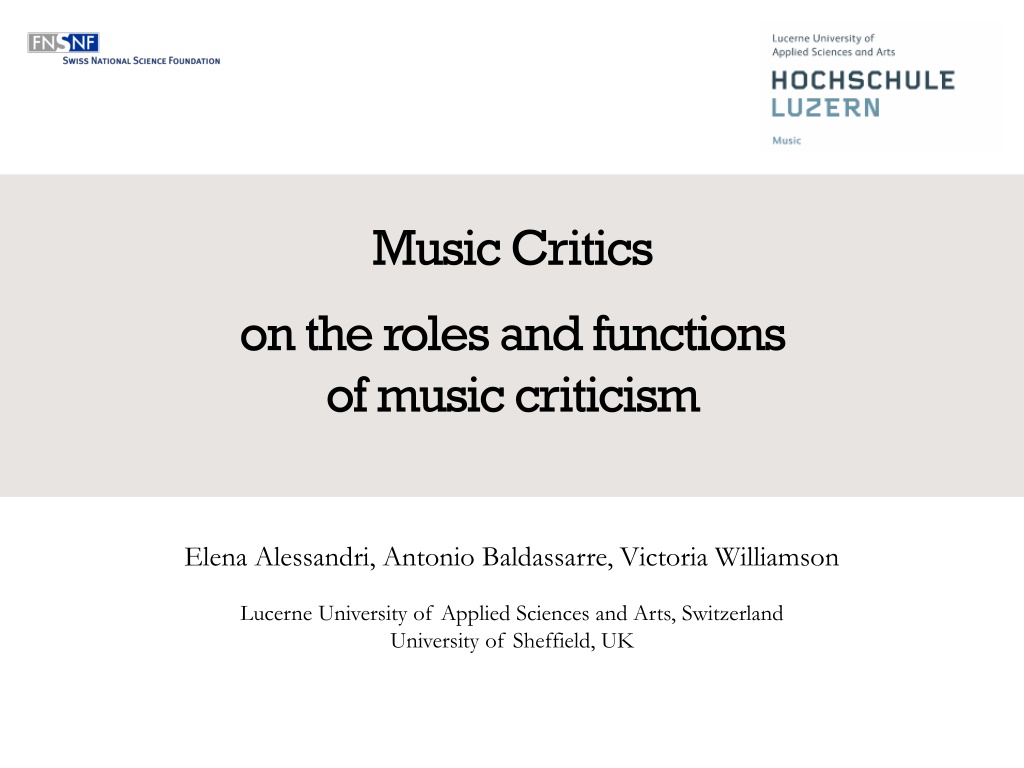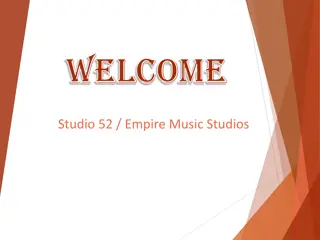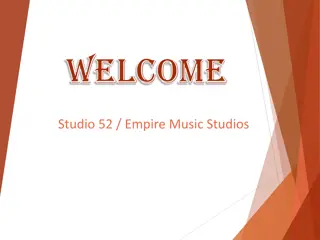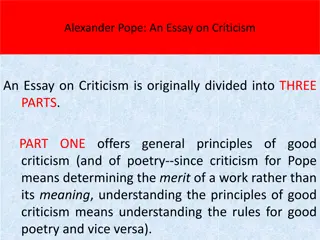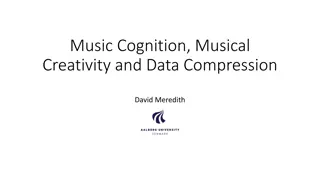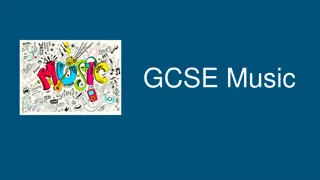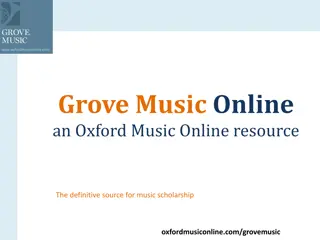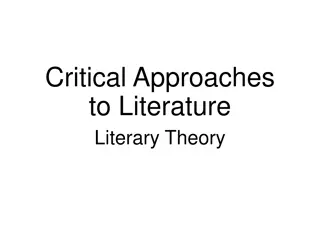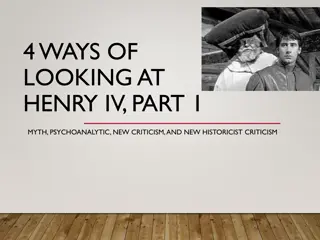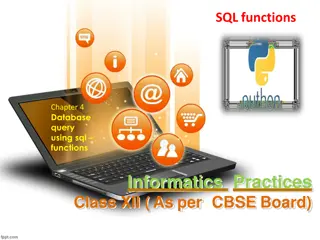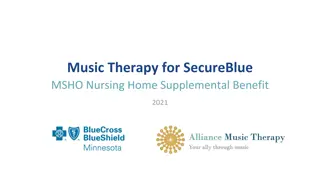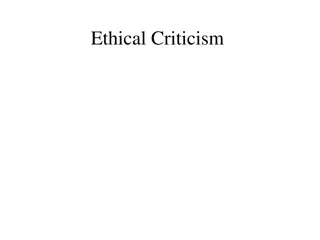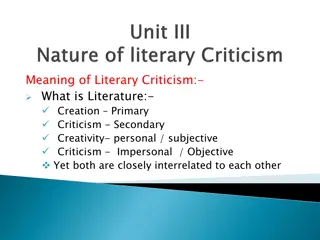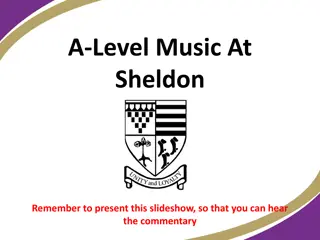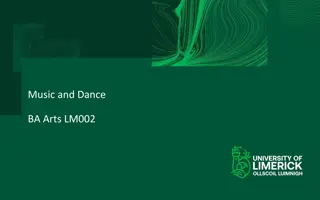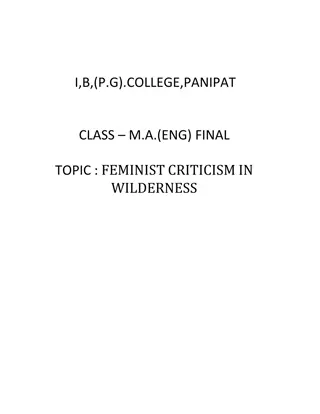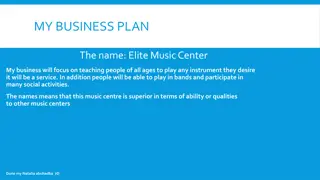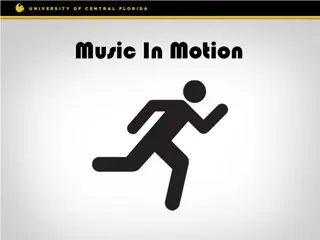Roles and Functions of Music Criticism: Insights from Researchers
Exploring the various aspects of music criticism, this study delves into the role of critics in evaluating music performance, their criteria for assessment, and the impact of their reviews. Researchers interviewed English and German-speaking critics to gain insights into their perspectives and practices, shedding light on the intricacies of music criticism.
Download Presentation

Please find below an Image/Link to download the presentation.
The content on the website is provided AS IS for your information and personal use only. It may not be sold, licensed, or shared on other websites without obtaining consent from the author. Download presentation by click this link. If you encounter any issues during the download, it is possible that the publisher has removed the file from their server.
E N D
Presentation Transcript
Music Critics on therolesandfunctions ofmusiccriticism Elena Alessandri, Antonio Baldassarre, Victoria Williamson Lucerne University of Applied Sciences and Arts, Switzerland University of Sheffield, UK
INTRODUCTION Goode s greater temperamental reserve gives his versions of these pieces an appealing refinement Pre-echo spoils the silence twelve bars after the change to four flats in the first movement I could wish that the recording companies would turn their attention to some of the lesser recorded sonatas
INTRODUCTION Music Performance Criticism Common form of written response Description, analysis, categorization, evaluation Focus on how the music work is performed Relevant to consumers and musicians
INTRODUCTION The Review Product: What critics write about Aspects of performance discussed Criteria used to evaluate performance Alessandri, Williamson, et al. (2016). A critical ear: Analysis of value judgements in reviews of Beethoven s piano sonata recordings. Frontiers in Psychology, 7:391 Alessandri, Williamson, et al. (2015). Beethoven recordings reviewed: a systematic method for mapping the content of music performance criticism. Frontiers in Psychology, 6:57 Alessandri (2014). The notion of expression in music criticism. In Fabian, Timmers & Schubert (Eds.), Expressiveness in music performance: Empirical approaches across styles and cultures. Oxford: Oxford University Press, 22-33 Alessandri, Eiholzer, Williamon (2014). Reviewing critical practice: An analysis of Gramophone sreviews of Beethoven s piano sonatas, 1923-2010. Musicae Scientiae, 18, 131-149
INTRODUCTION The Review Product: What critics write about The Process of Reviewing: Critics intentions and believes Critics View on The Role and Impact of Music Criticism
INTRODUCTION The Critic View
METHOD The Critics 8 English / 6 German speaking Age 32 76; 2 women / 12 men 32 year professional activity (40 reviews in a year) BBC Music, Gramophone, Fono Forum, Rondo, etc. Rich, varied experience Active performers, editors, record producers High Musical Sophistication Index (GoldMSI) Critics average 102.79 vs. population 81.58
METHOD The Interviews Summer 2016 UK, Germany, Switzerland In-depth Average length 1hr 42 (range 1hr 12 2hrs 57 ) Semi-structured Review content Use of language, style, rhetoric Role of professional criticism
METHOD The Analysis Double-coder Inductive Thematic Analysis I Model Development (English Interviews) Two researchers open coding Theme comparison and discussion Two researchers re-coding of whole text (Cohen s Kappa 0.985) II Model Application (German Interviews) Two researchers code application (Cohen s Kappa 0.897)
FINDINGS Things I am. I m concerned about guiding people to the product. Without reviews the market would only half-function, because it needs to have The role today of professional criticism? Well, it is that conduit from the producer to the public. It is that bridge. the critical input, the validation from Critics the power of the press is considerable, in terms of the effect it can have on the career of musicians. I think that s the sort of thing I m very, very aware of. I feel I m doing it for the musicians. I m writing for them.
FINDINGS Things I must be or have. Things I am. Have I said it in the simplest way, the clearest way possible? Have I used a long word where I can use a short word? That s not to say that you can t use there is an element of courage in reviewing. It sounds rather grand, but you have to be prepared to say what you believe and what you think. complex language, you can, but it has to be immediately understandable and immediately clear to the reader. that s important, that the Critic understands what the Artist is going through
FINDINGS Things I feel about my job.
FINDINGS The danger for Critics is to get too close to people in the business, so close you can t be truthful. find yourself out of work. libel anyone you have to be quite careful with your language to make sure that you don t say anything that they could take you to court over. it s very difficult to weed out what opinions are worth reading, for readers. The paid Critics are becoming fewer and further between. acquiring music, how do you guide people and do people want to be guided? if you don t take that Editor s advice, you might you have to always be thinking about the legal consequences, you don t want to the freeness of the internet is a great boon in some ways, but it s a disaster in others, because it s overload, information overload is what we have. And, you know, is now being staffed by people who are doing it as volunteers really. It s a free world. got YouTube and you ve got iTunes and, you know, all these massive channels for I m well aware that a very, very, very unkind review can damage people emotionally. I know that labels are liable to use my words to advertise the Pianist. So, I m aware of the power and the power of the press. we re in a world now where that bridge, between the producer and the consumer, I don t know how people are going to consume music. The question is if you ve Things I feel about my job.
FINDINGS Things I discuss.
FINDINGS It is a story. You have to be able to shape some kind of thread and narrative through it. It s interesting, I think, the use of whether you put yourself into the review or not. Whether you use I . if you use it in the right way, I think it can be quite a powerful thing. We have come to a conclusion. Begin with a fanfare. So get the reader s attention. And end with a cadence, so you get the feeling at the end that, yes, this is the end of the review. it s part of the information that you need to give, as to why you come to a particular conclusion about a disc. And I think that s, perhaps, what the essence of all of this is about. Because you have to, I think, you have to justify and make clear your process of thinking. Things I use when writing. Things I discuss.
TAKE AWAY POINTS Critics as mediators between producers, artists, and consumers. Multiple challenges: Changing role of criticism. Critics as a valuable source of expertise and reflected practice.
WHAT NEXT? The Review Product: What critics write about The Process of Reviewing: Critics intentions and believes The Consumer Voice: Listeners expectations on criticism
WHAT NEXT? The Review Product: What critics write about The Process of Reviewing: Critics intentions and believes Review Impact www.hslu.ch/reviewimpact The Consumer Voice: Listeners expectations on criticism Listeners expectations on criticism The Consumer Voice: Thank you!
